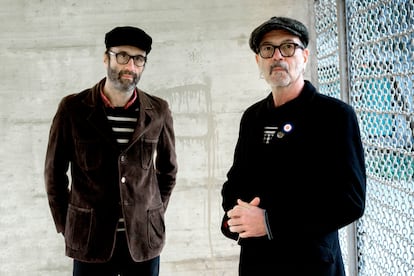Let them take away what we danced

Strictly opinion pieces that reflect the author's own style. These opinion pieces must be based on verified data and be respectful of individuals, even if their actions are criticized. All opinion columns by individuals outside the EL PAÍS editorial team will include, after the last line, a byline—no matter how well-known—indicating the author's position, title, political affiliation (if applicable), or main occupation, or any that is or was related to the topic addressed.

I suspected as much, but Ricky Gil , who knows his stuff, confirms it bluntly: “Musicians are divided between those who only leave the house when they play and those who are also part of the general public, aware that every night can bring a surprise.” I would expand on that further: those who never buy records and those who eagerly seek out new (or old) sounds.
No need to explain where Ricky Gil stands. His Who's Playing Tonight? (Sílex Ediciones), subtitled A History of Rock in 64 (+1) Concerts , is a self-portrait that contains a generational snapshot. And I'm not referring exclusively to his activism in the mod movement (Brighton 64, Los Brigatones, Matamala). Ricky's emotional memories encompass, perhaps due to the influence of his parents, singer-songwriters such as Paco Ibáñez, Lluis Llach, and Jaume Sisa.
And then there's her vocation for travel, including her year in Marseille, or following in the footsteps of her sister, the actress Ariadna. In Brazil, with a stop in Salvador de Bahía, she enjoys Ivette Sangalo, Timbalada, and Olodum, while experiencing the antipathy of many Bahian residents toward a Carlinhos Brown with an overvalued dollar. Always with her ears open: she attends a concert in Stockholm by an unknown bear named Ebbot Lundberg, and immediately recognizes that his "Calling from Heaven" is a sumptuous version of " Cercia de las estrellas" by Los Pekenikes (the official video even refers to the creators).
It's pleasing to note that Ricky, who can certainly be defined in political terms as a Catalanist, has no phobia of the so-called Movida Madrileña : he applies his affectionate magnifying glass to Nacha Pop and Parálisis Permanente; it's no coincidence that Matamala made a speedy version of Para ti , the poem-anthem by El Zurdo. He doesn't wear goggles: he describes the physical ruin of such an essential figure as the rumba renovator Gato Pérez or the professional decline of his idol Mose Allison, whom he catches in a New York club, where he gives up singing and plays the piano without amplification.
The chronology allows him to enjoy concerts by the colossal pioneers of the 1950s, verifying the stinginess of Chuck Berry or the enigma of Jerry Lee Lewis , who seems to be "mummified" in the dressing room, but on stage causes an earthquake, even though the concert only lasts 29 minutes. He also discovers that some groups create subcultures: a Grateful Dead concert brings together the mass of deadheads , nomads who follow the group. However, he doesn't forgive the sartorial slips: "The guitarist and singer Bob Weir was horribly sold out, wearing Tyrolean shorts, a sleeveless T-shirt, and hiking boots from Baix Montseny."
Everyone went to see everything. Or, at least, to listen: he followed Springsteen's legendary Barcelona debut from outside the Palacio de los Deportes ("honestly, we didn't care who was playing that night. We didn't discriminate"). Demand outstripped supply: buses were organized from Barcelona to attend the Rolling Stones concerts at the Vicente Calderón in the capital.
In the end, you realize that, beyond age or aesthetic differences, Ricky Gil's experiences are universal. Surely, inexplicable in the age of social media and streaming platforms. But, as the saying goes, let's not take away what we've had.
EL PAÍS





